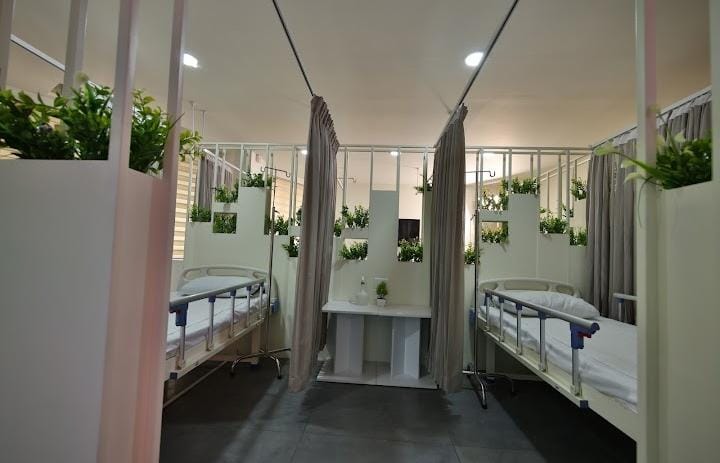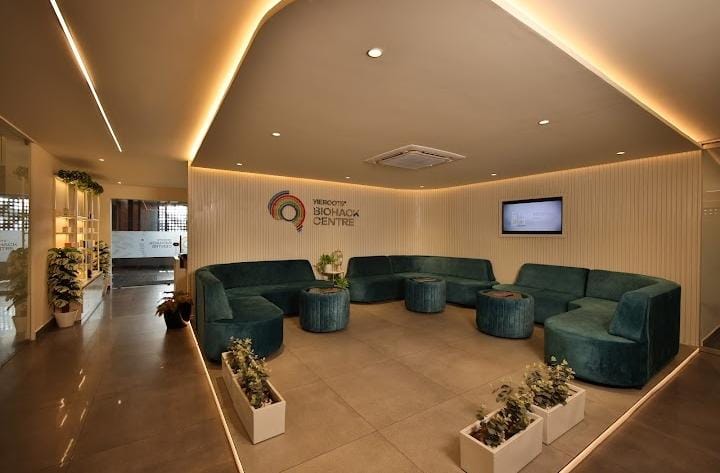Vieroots Biohack Center
Kakkanad - Ernakulam
Products & Services:
Vieroots Biohack Center, Kakkanad, Ernakulam, Reviews, Contact number, Phone number, Address, Map, W More..
Since : 2018
Kakkanad - Ernakulam
Products & Services:
Vieroots Biohack Center, Kakkanad, Ernakulam, Reviews, Contact number, Phone number, Address, Map, W More..
Since : 2018
Cardiac rehabilitation treatments are essential for individuals recovering from heart-related conditions, such as heart attacks, heart surgeries, or chronic cardiovascular diseases. In Kochi, several healthcare centers specialize in providing comprehensive cardiac rehabilitation programs designed to help patients regain strength, improve heart health, and reduce the risk of future heart-related events. These treatments are not only beneficial for post-operative recovery but also for patients aiming to prevent further heart issues.
Cardiac rehabilitation combines medical monitoring, physical activity, lifestyle counseling, and emotional support. The goal is to restore patients’ overall health by strengthening the heart, improving circulation, and promoting a healthy lifestyle. It focuses on individualized programs tailored to the patient’s needs and abilities, helping them lead a heart-healthy life.
Rehabilitation centres play a vital role in helping individuals recover from various physical, mental, and emotional challenges. These specialized facilities offer support, care, and treatment for people dealing with substance abuse, physical injuries, chronic illnesses, mental health issues, or other conditions that impair their ability to live a fulfilling life.
The primary purpose of rehabilitation centres is to provide a structured environment where individuals can regain independence, improve their health, and reintegrate into society. The centres typically offer programs tailored to the specific needs of each patient, promoting recovery through therapy, counseling, medical treatment, and support services.
Types of
Rehabilitation Centres
De-Addiction Centers –
Reclaiming Lives from Addiction
Addiction,
whether to alcohol, drugs, or other harmful substances, has become one of the
major public health issues worldwide. It not only affects the individual but
also disrupts families, relationships, careers, and society at large. De-Addiction
Centers serve as a crucial support system in helping individuals break free
from the chains of substance dependence.
These
centers provide structured environments and evidence-based treatments for
individuals battling various forms of addiction. From detoxification and
counseling to relapse prevention and family therapy, de-addiction centers offer
comprehensive rehabilitation services tailored to every individual’s needs.
De-Addiction
Centers are
specialized medical and psychological facilities focused on treating
individuals suffering from substance use disorders. These centers aim to help
individuals achieve sobriety and lead fulfilling lives by offering:
These
centers may operate as standalone private institutions, government-supported
hospitals, or part of multispecialty mental health facilities. They usually
involve a team of professionals including psychiatrists, psychologists,
addiction counselors, nurses, and social workers.
De-addiction
treatment can be inpatient (residential) or outpatient
(daycare/therapy sessions) depending on the severity of the addiction.
Types of Addictions Treated
Most
de-addiction centers are equipped to handle a wide range of substance and
behavioral dependencies. The most commonly treated addictions include:
1. Alcohol Addiction
Treatment
for chronic alcoholism involves detoxification, medication, behavioral therapy,
and long-term sobriety planning.
2. Drug Addiction
This
includes dependence on substances like opioids, cannabis, cocaine, heroin, and
prescription medications. Treatment focuses on withdrawal management, therapy,
and rebuilding life skills.
3. Tobacco/Nicotine Addiction
Behavioral
therapy and nicotine replacement therapy are commonly used to help individuals
quit smoking or chewing tobacco.
4. Behavioral Addictions
Some
centers also offer therapy for non-substance addictions such as gambling,
internet addiction, or pornography addiction.
5. Dual Diagnosis Cases
Many
individuals suffer from both addiction and mental health issues like
depression, anxiety, or PTSD. Integrated treatment is essential in these cases.
Ortho
Neuro Rehabilitation Centres specialize in providing comprehensive care to
individuals dealing with orthopedic and neurological conditions. These centres
focus on the recovery and rehabilitation of patients with musculoskeletal
injuries, neurological disorders, and chronic conditions that affect mobility,
motor skills, and overall physical functioning.
The
primary goal of these centres is to help patients regain their independence,
improve physical abilities, manage pain, and enhance their overall quality of
life. Ortho neuro rehabilitation combines physical therapy, occupational
therapy, and other specialized treatments to address both orthopedic and neurological
impairments.
Conditions
Treated in Ortho Neuro Rehabilitation Centres
Key
Components of Ortho Neuro Rehabilitation
Benefits
of Ortho Neuro Rehabilitation
Importance
of Ortho Neuro Rehabilitation Centres
These
centres are essential for individuals who have suffered from orthopedic
injuries or neurological disorders, providing specialized care that helps them
regain their independence, manage chronic conditions, and improve their overall
health. The interdisciplinary approach at ortho neuro rehabilitation centres
ensures that patients receive holistic treatment that addresses both the
physical and neurological aspects of their condition, leading to a faster and
more effective recovery process.
Advanced
rehabilitation for chronic diseases focuses on improving the quality of life
for individuals dealing with long-term, debilitating health conditions. Chronic
diseases, such as heart disease, diabetes, cancer, chronic respiratory
diseases, and neurodegenerative conditions, often lead to physical limitations,
pain, and reduced functionality. Rehabilitation programs for chronic diseases
are designed to help patients manage symptoms, regain independence, and improve
their overall physical and mental well-being.
The
primary aim of advanced rehabilitation for chronic diseases is to enhance the
functional capabilities of patients, minimize the impact of the disease on
daily life, and prevent further complications. Through a multidisciplinary
approach, these programs address the physical, emotional, and social needs of
individuals with chronic conditions.
Conditions
Treated in Advanced Rehabilitation Programs
Key
Components of Advanced Rehabilitation for Chronic Diseases
Benefits
of Advanced Rehabilitation for Chronic Diseases
Importance
of Advanced Rehabilitation for Chronic Diseases
Chronic
diseases often lead to prolonged physical limitations, emotional challenges,
and reduced quality of life. Advanced rehabilitation for chronic diseases
offers a holistic approach to managing these conditions, addressing both
physical and emotional needs. By empowering patients with knowledge, therapy,
and support, these programs help individuals regain control over their lives,
prevent complications, and improve their long-term outcomes. Through
personalized care and multidisciplinary support, rehabilitation becomes a
critical component of chronic disease management, promoting overall wellness
and a higher quality of life.
1. What is the difference between Ortho Neuro
Rehabilitation and Advanced Rehabilitation for Chronic Diseases?
Ortho
Neuro Rehabilitation focuses on recovery from orthopedic and neurological
conditions, while Advanced Rehabilitation for Chronic Diseases deals with
managing long-term conditions like diabetes, heart disease, and arthritis
through specialized treatment plans.
2. How long does rehabilitation take?
The
duration of rehabilitation varies depending on the individual’s condition,
severity, and response to treatment. Some programs may last a few weeks, while
others might extend to several months for chronic conditions.
3. Is rehabilitation covered by insurance?
Yes, many
insurance providers cover rehabilitation services, but it’s important to check
with your specific provider for details on coverage and eligibility.
4. What are the key components of a rehabilitation
program?
A
comprehensive rehabilitation program typically includes physical therapy,
occupational therapy, speech therapy (if necessary), and psychological support.
Nutritional counseling and patient education may also be part of the program,
especially for chronic disease management.
5. Can I continue rehabilitation at home?
Yes, many
rehabilitation programs offer home-based exercises and follow-up care to ensure
continued progress. Home rehabilitation is especially useful for those who have
completed in-clinic sessions and want to maintain their progress.
6. Who is involved in the rehabilitation process?
A
multidisciplinary team of healthcare professionals typically oversees
rehabilitation. This team includes physiotherapists, occupational therapists,
speech therapists, nurses, and sometimes psychologists or dietitians, depending
on the patient’s needs.
7. What kind of equipment is used in
rehabilitation?
Rehabilitation
centres may use specialized equipment like treadmills, stationary bikes,
balance boards, and resistance machines to enhance treatment outcomes.
Neurological rehabilitation may also involve devices that stimulate muscle
contractions.
8. Can rehabilitation fully restore normal
function?
While
rehabilitation can significantly improve function and quality of life, full
recovery depends on the severity of the condition, patient participation, and
other health factors. The goal of rehabilitation is to maximize independence
and functionality.
9. What is the role of family in the rehabilitation
process?
Family
support is crucial for motivation and helping the patient follow their
rehabilitation program. Families are often involved in education sessions and
may assist with exercises at home.
10. How can I find the right rehabilitation centre?
When
choosing a rehabilitation centre, consider factors like the expertise of the staff,
the availability of specialized treatments for your condition, and the centre’s
reputation. It’s also important to ensure that the facility provides
personalized care tailored to your specific needs.

Ernakulam, Kakkanad

Ernakulam, Kakkanad
Latest Customer Reviews
"Best Skin Treatment Center in Ernakulam 👍"